Seems to me that these grebes are cutting the nesting season window a little tight.
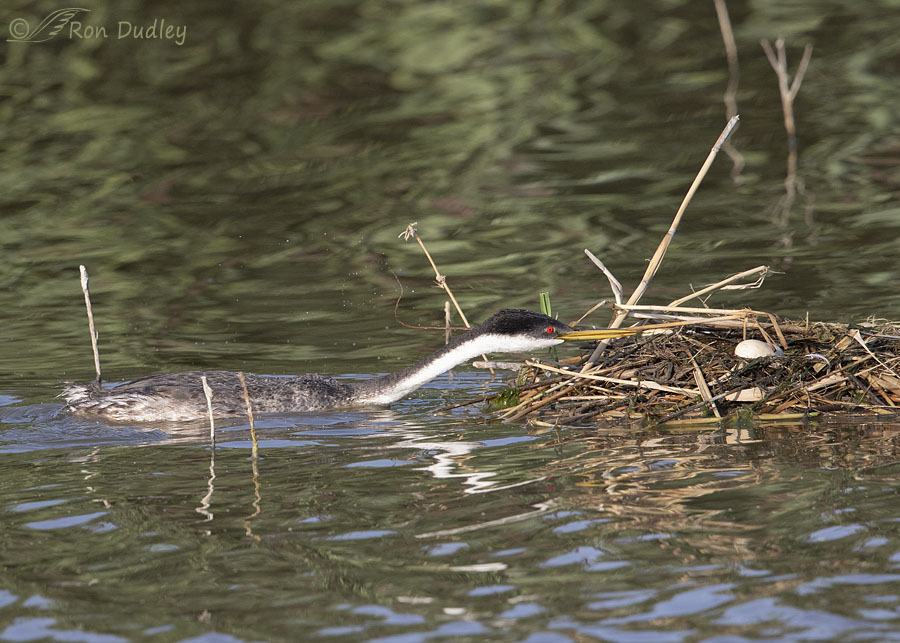
Yesterday morning I photographed a Western Grebe still incubating eggs. In this species both sexes incubate but based on bill shape my best guess is that this is the male, though I could be wrong.
As I drove by the first time he was getting off the nest for a brief break from his duties so I turned around so I could photograph him out my driver’s side window. Here he appeared to be inspecting the two eggs in the nest (clutch size for this species is 2-3 eggs).
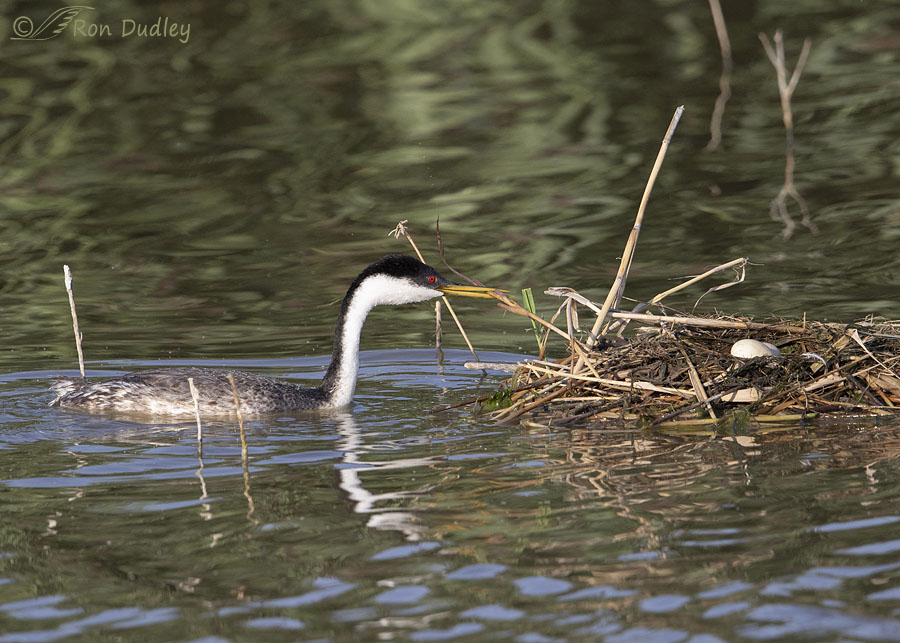
Several times he rearranged some of the vegetation on the nest.
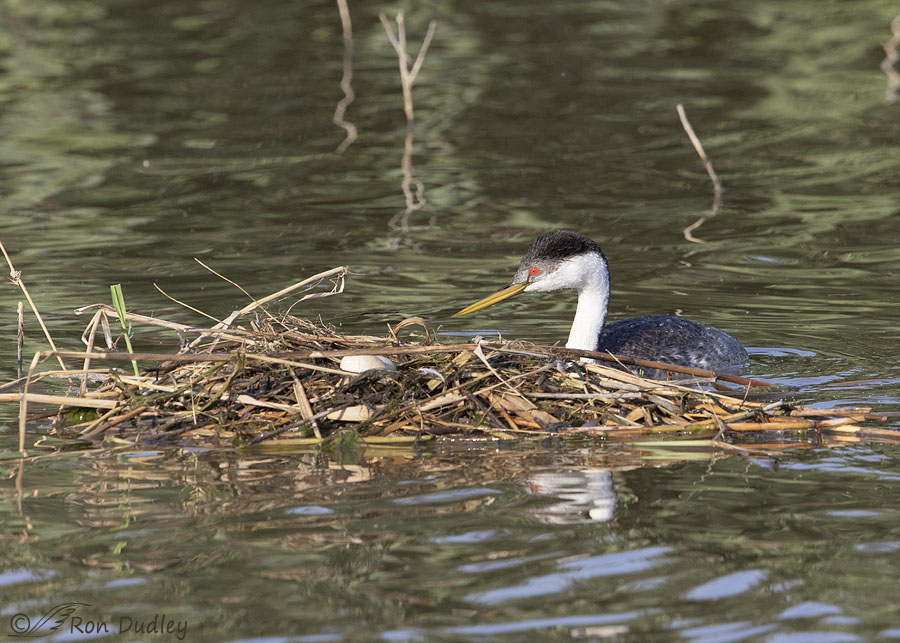
Eventually he decided it was time to get back on the eggs. Western Grebes are exquisitely designed for life in the water but they can barely walk on land or any dry surface, including their nest. They have huge awkward feet and their legs are attached at the rear of their body, an arrangement that makes walking next to impossible.
So even the short trip from the water’s edge to the eggs was going to be a challenge.
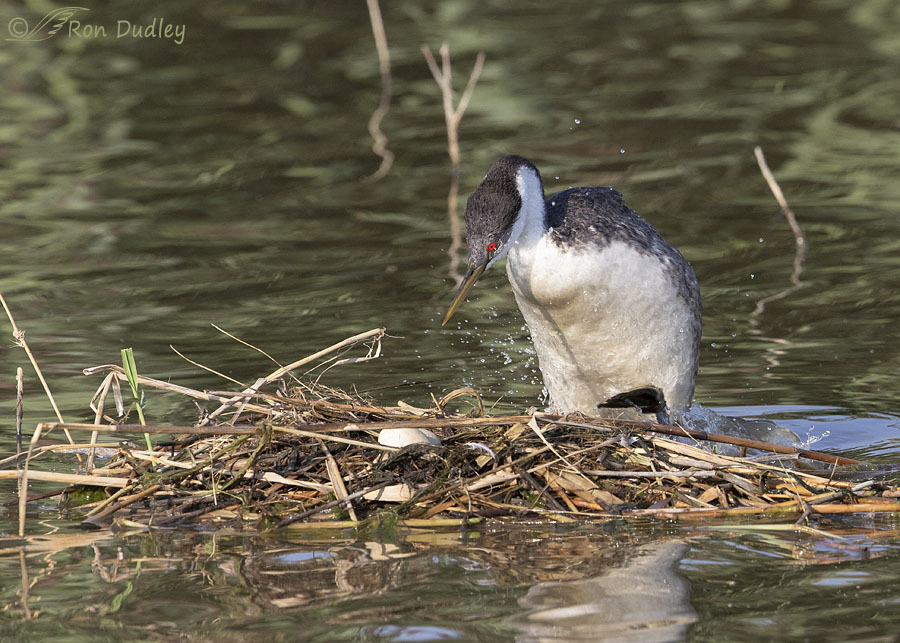
He popped up out of the water…
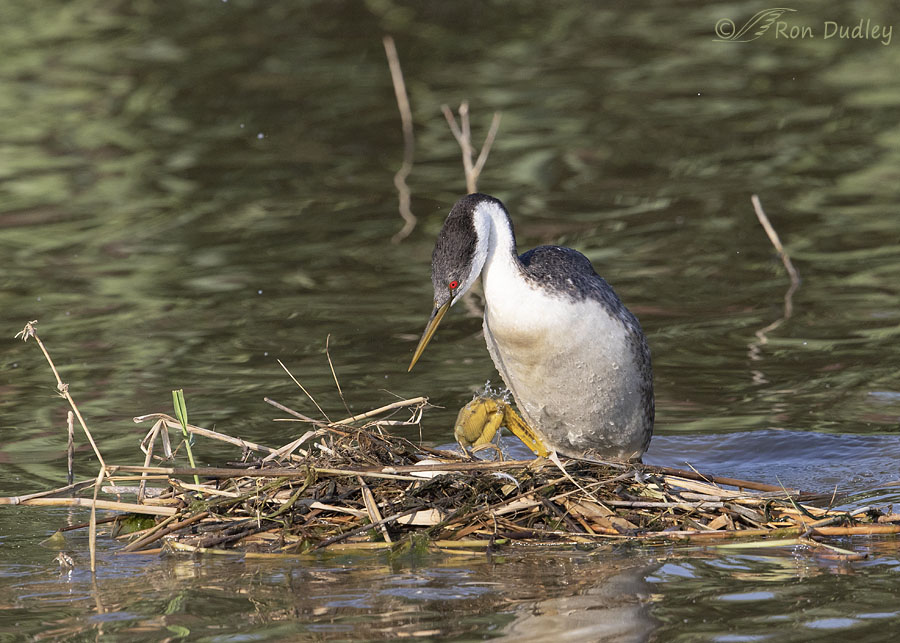
and began his awkward and painfully slow journey to the eggs.
As he approached the eggs he had to place those huge lobed feet very carefully…
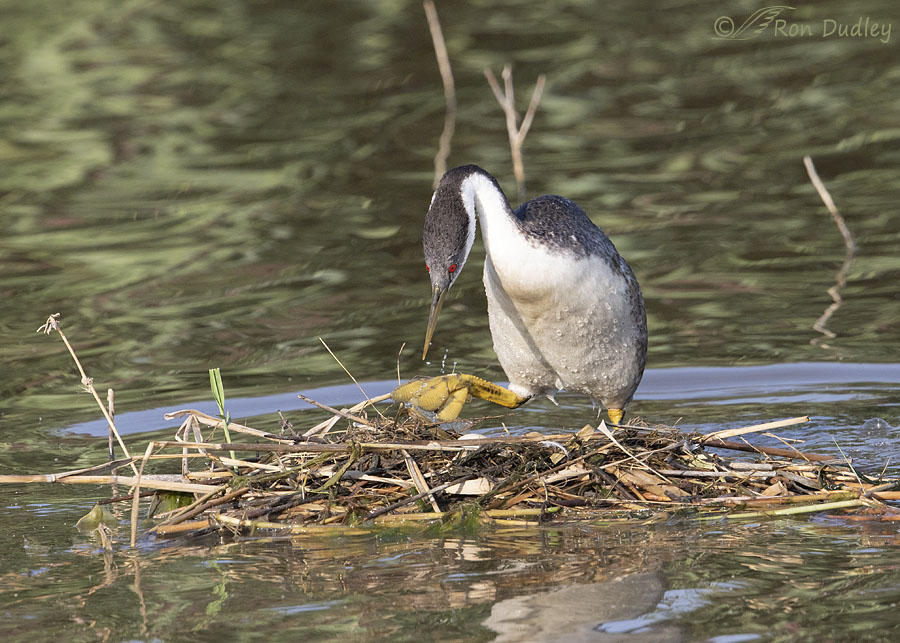
to avoid damaging them.
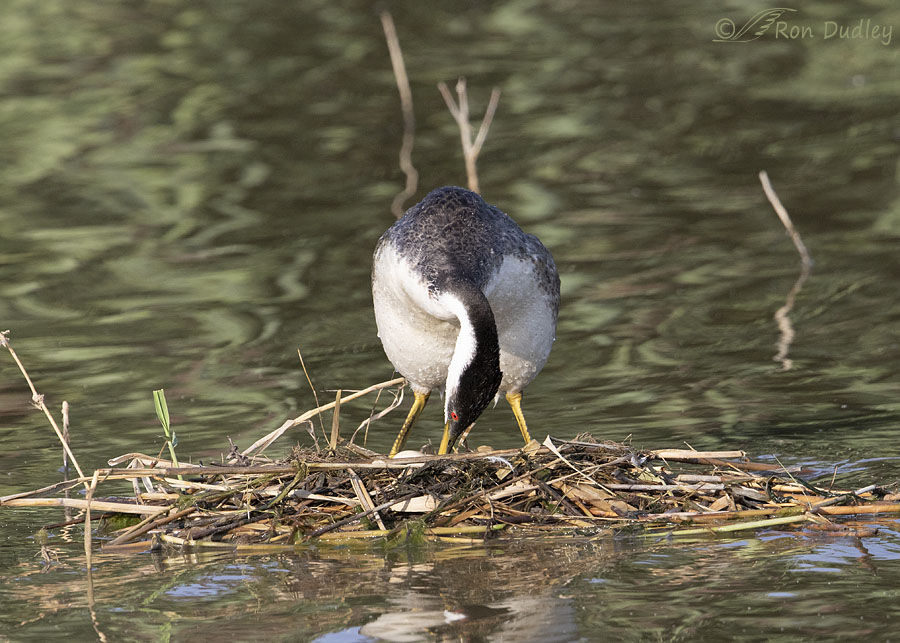
Then with his legs splayed and his feet far apart to accommodate the eggs he appeared to turn them partially over which is typical behavior for most incubating birds.
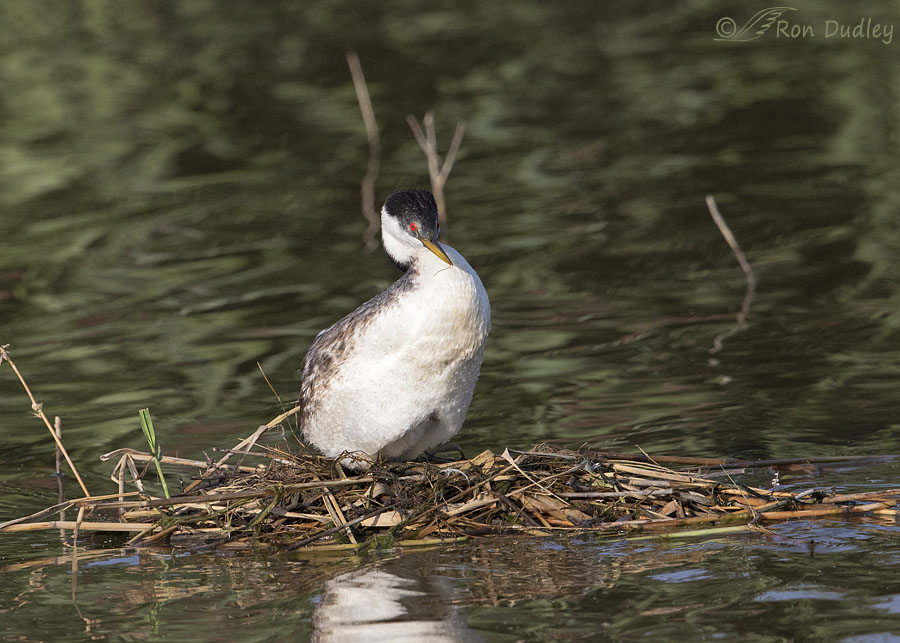
Then he exposed his brood patch just prior to settling down on the eggs. In this species both sexes have a brood patch so its presence isn’t a reliable indicator of sex.
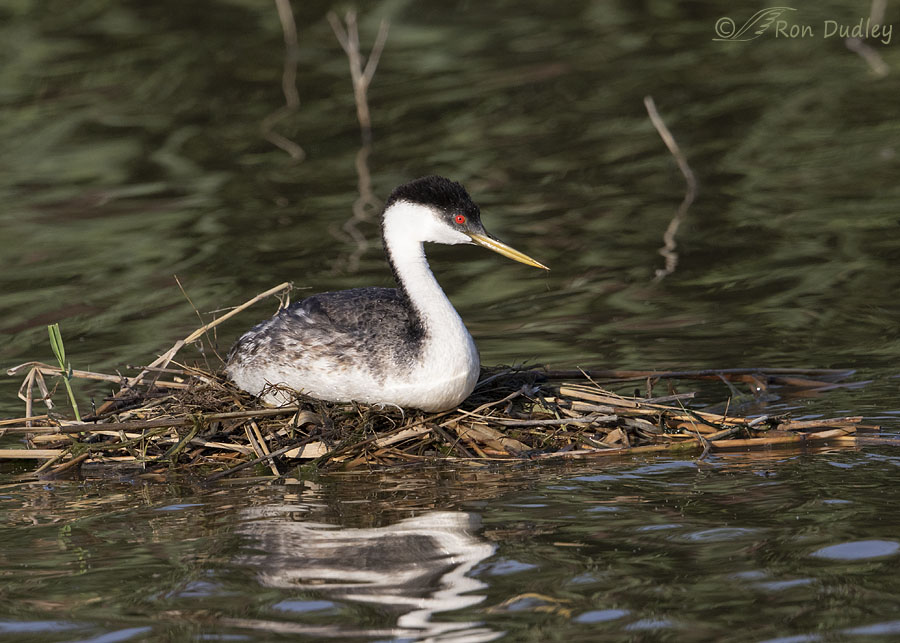
He didn’t stay settled on the eggs for long. Apparently something didn’t feel quite right so he…
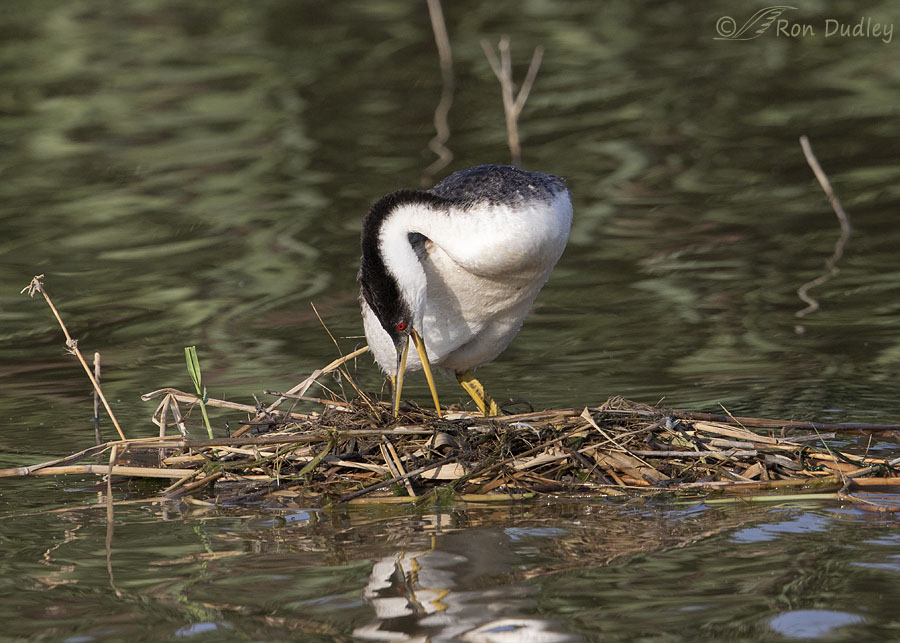
stood up again and appeared to turn or rearrange the eggs one more time.
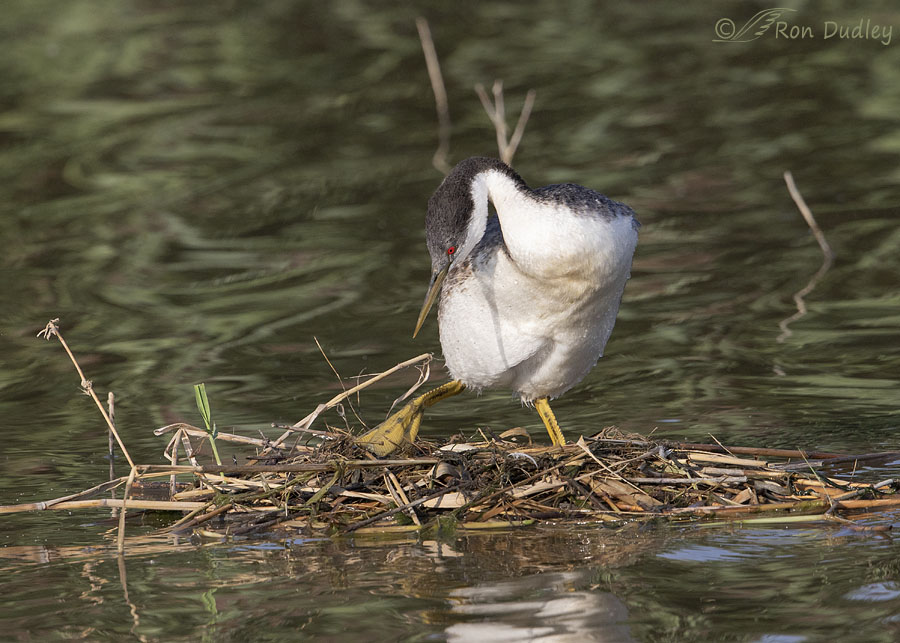
He did a little dance to get his feet far enough apart before…
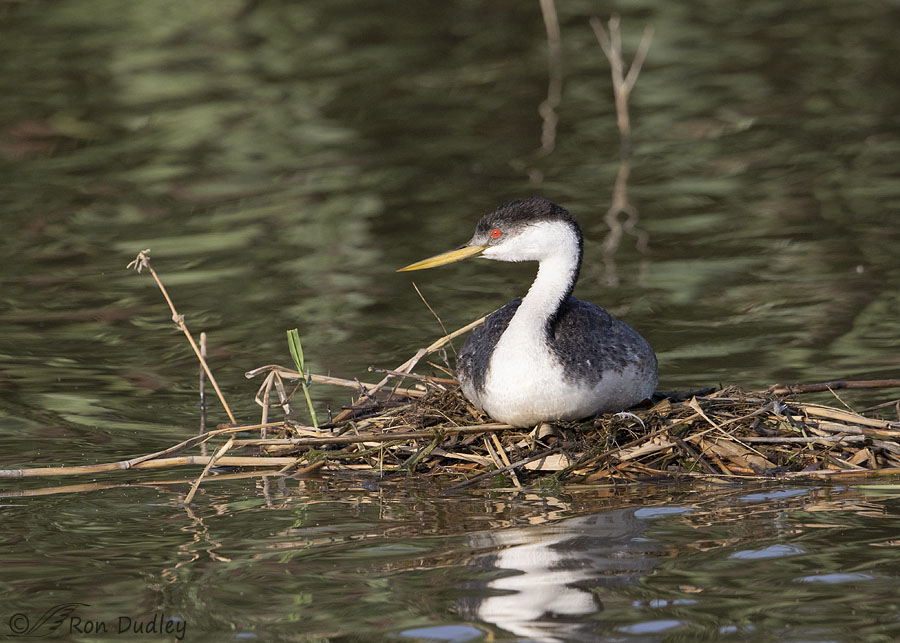
settling back down on the eggs. This time he seemed comfortable so I left him and drove down the road to look for more birds.
Western Grebes are known to have an extended nesting season but this pair seems to be cutting it a little close. The incubation period for this species is 24 days but even if we assume that these eggs will begin hatching today the adults will still back brood the young chicks for up to a month. Youngsters stay with their parents until migration but it takes 70 days for the flight feathers to fully form, allowing them to make short flights and become completely independent.
Depending on how early the snow flies that seems to be cutting it a little close, especially if these eggs aren’t close to hatching.
I probably worry too much but worry I do.
Ron


Wonderful documentation of the bird’s behavior. The photos speak for themselves because of your patience in capturing the nuances of the grebe’s “simple” act of settling down on a clutch. Of course, if you hadn’t guided me a bit I probably would have missed it all!
Thank you, Kenneth.
You worry for this family and now, so will I! Not that it ever does any good, but lifelong habits are lifelong. Despite the worry for their ultimate fate, your images & narrative really made me smile (and chuckle). I don’t know much about nor do I often seek out “water birds,” but I love learning what I do from you! And will hold a good thought for the eggs/chicks and parents.
“Not that it ever does any good, but lifelong habits are lifelong”
Kathy, that’s me, nailed. I’ve been a serious worrier from day one and even though I repeatedly tell myself that worrying is less than nonproductive I can’t break the habit. My worrying used to drive my daughter bonkers when she was growing up.
Oh my ..great pictures and narrative. Just have to love those feet. One has to be impressed with the careful placement o those feet and the way he was not quite satisfied with his first position. Looking at the satisfied look on his face he feels everything is where it should be! Heartwarming post. 😍
Yup, he was very particular about where he wanted his feet placed, Kathy. Given their size it’s a good thing.
Parenting is not easy. Regardless of species.
And a big hooray for the shared load.
Thanks Ron and like you, and all your readers I hope that they haven’t left it too late. So much I hope it.
They’re probably going to be just fine, EC. I’m just a worry wart…
You are soooo not alone.
I cross (and recross) mental bridges before I am sure there is a river.
On book I have says they are occasionally “…caught on freshwater lakes that freeze late in fall… and starve…” Let’s hope it’s a late freeze and/or the chicks fledge sooner than average.
If I see them out here on the Salish Sea this winter, I’ll let you know.😉
Lyle, if we have a mild winter a few of them stick around for most of it. I doubt the juvies could survive it though.
Such a warm, wonderful series. I so enjoy your grebe photography. Like Laura, I love watching animals parent. Those lobed feet are a hoot!
Hope they make it! I now have two reasons to worry — yours and April’s.
Thanks, Marty. The reason April mentioned is a significant one.
Wonderful series! I hope they do well before hunting season too. It starts too soon and goes on for way to long. Maybe they will move to a no hunting section once they hatch, if the canals are connected.
I strongly agree with you about hunting season, April. It’s WAY too long!
Great series! I’ve never seen a Western Grebe out of the water. It was interesting to see those feet and how they are positioned on the body. I now understand why it’s so unusual to see them out of the water.
Thanks, Steve. I rarely see any grebe species out of the water but it does happen occasionally with several of them, perhaps all of them.
Have I mentioned that I LOVE your behavioral series? I absolutely LOVE them! And you’re an excellent teacher!
WOW! Those feet! Makes me wonder the why part of why they evolved in that direction? I’m CERTAIN there’s a reason, but again, Mother Nature holds her cards very close to her chest! I have so many of those questions! But I also enjoy pondering the mystery. I call it residing in the question.
I just LOVE watching birds of most kinds parent! Granted, there’s that bell curve thing where species range from helicopter parents (not many of those in the Great Out There) down to the sea turtle and guppy parents. Birds, overall, are great parents. They’re very careful/diligent in how they build their nests, how they incubate the eggs, brood the kiddos and teach them how to be what they are. They’re generally a mixture of tender nurturing and drill sergeant taskmaster, insisting the kids learn life skills in a timely manner. Humans could learn SO much from them!
The timing makes me wonder if their first nest might have failed? And here we are, back to those pesky questions again!
BTW, male redtails have brood patches, too, although they’re not as large as the female’s. Makes sense since they do incubate and sometimes brood, but the female is generally large and in charge on the nest.
“The timing makes me wonder if their first nest might have failed?”
It’s possible, Laura. Western Grebes are known to renest if the original brood is lost.
Wonderful series, Ron. Another great kid’s book! What a good Dad!!
Thanks!
This is as close as that book will ever get to being published… 🙂
Fantastic behavioral series Ron! Thanks for sharing!
Thanks, Charlotte.
Do you remember ever seeing a brood this late in the past ? I wonder
if there’s a climate cue to which this grebe family is responding ? Are
their nests actually floating, or are they built on shallow islets amid the
water’s body ? Amazing that they’re able to maneuver those ENORMOUS
feet so well……
Kris, I don’t believe I’ve ever seen grebes nesting any later than this.
Here’s what Cornell has to say about your question about floating nests:
“A rather solid mound of vegetation with a shallow depression for the eggs. Built up from bottom or a submerged snag, or floating in up to 3 m of water and anchored to emergent or floating plants; rarely on land where built of small amounts of surrounding vegetation”
Very educational series as well as excellent photography. Those feet are definitely not for work on land. I have never seen one out of the water so very interesting to me. About a week ago I saw a Pied-billed Grebe mom swimming around with her brood of five. She had pulled up a huge bullfrog that she had zero chance of swallowing so she just let the little ones peck at it for a while before letting it go. Many years back I was so surprised the first time I saw their nests right out on the water.
Thanks, Everett. I’ve seen Pied-billed Grebes literally butchering frogs by shaking them violently so the pieces would be small enough to swallow.
I would worry too. I love the look in the bird’s eyes. Love before the chick’s even hatch.
Jean, they probably “know” what they’re doing but geez, why cut it so close.
Wonderful series on photos and VERY interesting that they are nesting this late Mother Nature being as capricious as she is on when “fall” arrives! Those feet are always amazing on an otherwise elegant looking bird……. 😉
Judy, I think grebe and coot feet are among the most interesting in the bird world.